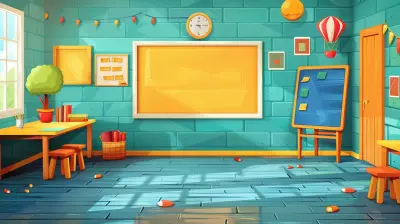The Role of Critical Thinking in Standardized Test Performance
4 March 2025
In today’s fast-paced, competitive world, academic performance is often measured by how well students perform on standardized tests. Love them or loathe them, these tests are an integral part of the educational landscape. But here's the thing—what separates the high performers from the rest? Is it just rote memorization, or is there something more at play? That’s where critical thinking comes into the picture.
Critical thinking is the ability to analyze, evaluate, and synthesize information to make reasoned judgments. In a world full of information overload, the ability to think critically is becoming more essential than ever. But how does it impact standardized test performance? Let’s dive in and explore the role of critical thinking in acing those high-stakes exams.

What Are Standardized Tests?
Before we get into the nitty-gritty of critical thinking, let’s first talk about what standardized tests are. You’ve probably taken one (or many) in your life. Common examples include the SAT, ACT, GRE, and various state-mandated exams in the K-12 system. These tests aim to measure students' mastery of particular subjects or skills in a controlled, consistent way.The idea is that everyone takes the same test under similar conditions, allowing for a "standard" way to assess performance. That sounds fair, right? Well, not always. Many argue that standardized tests emphasize memorization over true understanding, but those who excel tend to have one thing in common—they're good critical thinkers.
Why Are Standardized Tests Important?
Like it or not, standardized tests often serve as gatekeepers for future opportunities. They can determine whether you get into the college of your choice, qualify for scholarships, or even land a job in certain fields. For educators, standardized tests are a way to gauge how well students are grasping the curriculum. For students, they can be the difference between success and frustration.But here’s the catch: simply memorizing formulas, dates, or vocabulary words won’t always cut it. To truly excel, you need to think critically about the questions being asked and the answers you’re providing. Without critical thinking, even the most well-prepared student may stumble.

What Is Critical Thinking?
So, what exactly is critical thinking? Let’s strip it down to its basics. Critical thinking involves being curious, skeptical, and open-minded all at the same time. It’s about questioning assumptions, evaluating evidence, and making well-reasoned decisions. In essence, it's about not just accepting information at face value but digging deeper to understand the "why" and "how."Imagine you’re a detective. Critical thinking is like putting on your detective hat and analyzing the clues. You don’t just want to know what happened; you want to figure out why it happened and how all the pieces fit together.
In academic settings, critical thinking is what allows students to go beyond surface-level understanding and engage with the material in a meaningful way. It’s the difference between just knowing facts and being able to apply those facts to solve complex problems.

The Connection Between Critical Thinking and Standardized Tests
Now comes the million-dollar question: How does critical thinking impact standardized test performance?Decoding Complex Questions
Many standardized tests, especially those like the SAT, GRE, or even AP exams, include questions that go beyond simple recall. These questions require you to analyze a passage, graph, or scenario and come to a conclusion. Memorizing facts won’t help much here. You need to interpret the information, weigh different perspectives, and then choose the best answer.For example, in the SAT Reading section, it’s not enough to just read the passage and answer questions based on a surface-level understanding. You need to think critically about the author’s intent, the tone of the passage, and what information is explicitly stated versus what is implied. The students who excel in this section are those who ask themselves, "What is the author really trying to say here?" or "How do these two pieces of information connect?"
Problem-Solving in Math
Math may seem like an area where memorization reigns supreme, but even here, critical thinking plays a crucial role. Sure, you need to know your formulas, but the types of problems you’ll encounter on standardized tests often require more than just plugging in numbers.Take for example a word problem that involves multiple steps. You need to critically think about what the question is asking before you can even begin to solve it. Is it a geometry question cloaked in a real-life scenario? Does it involve algebraic reasoning? The ability to break down the problem into manageable parts and approach it logically is a form of critical thinking in action.
Time Management and Prioritization
Here’s something a lot of people overlook: critical thinking doesn’t just help you answer questions; it also helps you manage your time during the test. Let’s face it, standardized tests are often a race against the clock. You might know the material, but if you don’t handle your time wisely, you won’t get the chance to show what you know.Critical thinkers are better at prioritizing questions. They can quickly assess which questions are worth spending more time on and which ones can be answered more easily. They’re also better at recognizing when they’re stuck, so they can move on and come back later if time permits. This kind of strategic thinking can be just as important as knowing the answers.

How To Develop Critical Thinking Skills
Okay, so we’ve established that critical thinking is essential for standardized test success. But how do you develop critical thinking skills? The good news is that critical thinking isn’t an innate talent—it’s a skill you can cultivate with practice. Here are some tips to get you started:1. Ask Questions
One of the easiest ways to develop critical thinking is by becoming more inquisitive. Ask questions about everything. Why did the author choose this word? How does this formula apply to real-world problems? What assumptions am I making?By constantly questioning the material, you train your brain to think deeply about the subject matter. You’ll start to see connections and patterns that you might have otherwise missed.
2. Analyze Different Perspectives
In any subject, there are often multiple ways to approach a problem or interpret information. Practice looking at situations from different angles. For example, if you’re reading a historical text, think about how people from different backgrounds might interpret the same event.This ability to consider various perspectives is especially useful for standardized tests, where questions often present multiple viewpoints or ask for nuanced interpretations.
3. Practice Problem-Solving
Critical thinking is all about finding solutions to problems, so the best way to improve is to practice! Try working through sample test questions, but don’t just focus on getting the right answer. Think about why certain answers are correct and why others aren’t. This kind of reflective practice will improve your ability to think critically under pressure.4. Reflect on Mistakes
It’s easy to move on from a wrong answer without thinking about it too much, but that’s a missed opportunity for growth. Take the time to reflect on your mistakes. Why did you choose that answer? What assumptions did you make that led to the wrong conclusion?By analyzing your errors, you’re essentially training your brain to avoid similar mistakes in the future. It’s a classic case of learning from failure.
5. Engage in Discussions
One of the most effective ways to sharpen your critical thinking skills is through discussion. Whether it’s with classmates, teachers, or even friends, discussing different topics forces you to articulate your thoughts and defend your reasoning.Engaging in debates or discussions allows you to test your ideas against those of others. This back-and-forth exchange fosters deeper understanding and helps you see things from different perspectives. It’s like lifting weights for your mind.
Conclusion: The Critical Thinking Advantage
So, can critical thinking really make or break your standardized test performance? Absolutely. While memorization might get you through the basics, it’s critical thinking that will help you tackle the complex, multi-layered questions that often determine your score. Whether you’re analyzing a tricky passage, solving a challenging math problem, or managing your time effectively, critical thinking is your best ally.The good news? Critical thinking is a skill that can be cultivated with practice. By asking questions, analyzing perspectives, practicing problem-solving, reflecting on mistakes, and engaging in discussions, you can hone your critical thinking skills and give yourself a significant edge when it comes to standardized tests.
So, the next time you sit down to prepare for a test, don’t just focus on memorizing facts and formulas. Put on your detective hat, question everything, and start thinking critically. It could make all the difference.
all images in this post were generated using AI tools
Category:
Standardized TestingAuthor:

Eva Barker
Discussion
rate this article
18 comments
Eden Rogers
This article effectively highlights the pivotal role of critical thinking in enhancing standardized test performance. While tests often assess rote memorization, fostering critical thinking skills can lead to deeper understanding and better problem-solving abilities, ultimately benefiting students’ overall education.
March 25, 2025 at 11:28 AM

Eva Barker
Thank you for your insightful comment! I completely agree that critical thinking plays a crucial role in improving test performance and enriching overall education.
Isaiah Alvarez
Great article! Embracing critical thinking not only boosts standardized test scores but also makes learning more enjoyable. Let's empower students to think creatively and analytically—who knew testing could be so much fun? Keep up the fantastic work!
March 23, 2025 at 1:33 PM

Eva Barker
Thank you for your thoughtful comment! I completely agree—enhancing critical thinking not only improves test scores but also enriches the learning experience. Let’s keep encouraging creativity and analytical skills!
Runehart Harper
This article effectively highlights the importance of critical thinking in enhancing standardized test performance. It offers valuable insights into how we can better prepare students for success.
March 23, 2025 at 5:53 AM

Eva Barker
Thank you for your thoughtful comment! I'm glad you found the article insightful in emphasizing the role of critical thinking in student success.
Madison Barnes
This article beautifully highlights the importance of critical thinking in standardized tests. Emphasizing these skills not only boosts performance but also prepares students for real-world challenges. A thoughtful approach indeed! Thank you for sharing this insight.
March 20, 2025 at 10:00 PM

Eva Barker
Thank you for your thoughtful comment! I’m glad you found the article insightful. Critical thinking is indeed vital for both test success and real-world applications.
Fay McIntosh
Critical thinking skills are essential for effective problem-solving and decision-making, and fostering these abilities can enhance student performance on standardized tests, bridging academic knowledge with real-world application.
March 19, 2025 at 5:18 AM

Eva Barker
Thank you for your insightful comment! I completely agree that critical thinking is vital not only for problem-solving and decision-making but also for improving student outcomes on standardized tests by connecting academic knowledge with practical application.
Zander McLain
This article insightfully highlights the crucial link between critical thinking and standardized test performance. By fostering analytical skills and problem-solving abilities, educators can better prepare students for these assessments, ultimately enhancing their academic success and equipping them for real-world challenges. Great read!
March 17, 2025 at 8:16 PM

Eva Barker
Thank you for your thoughtful comment! I'm glad you found the connection between critical thinking and test performance insightful. Your support means a lot!
Aisha Mullen
In the dance of minds, critical thinking shines, guiding students through tests, unlocking potential, and breaking confines.
March 15, 2025 at 5:21 AM

Eva Barker
Thank you! I appreciate your poetic take on the importance of critical thinking in education. It truly is a key to unlocking students' potential in standardized testing.
Ethan McGivern
Critical thinking boosts test success—happy studying!
March 14, 2025 at 7:48 PM

Eva Barker
Thank you! Critical thinking truly is essential for mastering test challenges. Happy studying to you as well!
Dusk Mercado
Critical thinking plays a crucial role in standardized test performance by enabling students to analyze questions, evaluate information, and apply knowledge effectively. Enhancing critical thinking skills can lead to improved problem-solving abilities, better comprehension, and ultimately higher test scores, fostering educational success.
March 14, 2025 at 12:02 PM

Eva Barker
Thank you for your insightful comment! I completely agree that enhanced critical thinking skills significantly contribute to better test performance and overall academic success.
Rayna Barron
Think critically, ace tests effortlessly!
March 12, 2025 at 7:24 PM

Eva Barker
Thank you! Critical thinking is indeed key to understanding concepts and improving test performance.
Virginia Rhodes
Critical thinking in standardized tests is like the secret sauce in grandma's famous recipe—essential for success but often overlooked! It's the difference between bubbling over with creativity and merely boiling down to the basics. Let’s stir the pot of knowledge and see what delicious insights we can serve up!
March 12, 2025 at 11:49 AM

Eva Barker
Absolutely! Critical thinking is indeed the key ingredient that transforms standardized tests from rote memorization into a rich exploration of knowledge and creativity.
Rosalie Underwood
Critical thinking enhances problem-solving skills, leading to improved performance on standardized tests and beyond.
March 11, 2025 at 12:18 PM

Eva Barker
Thank you for your insight! I completely agree—critical thinking is essential not only for test performance but also for real-world problem-solving.
Harlow McGlynn
Critical thinking is crucial for improving standardized test performance effectively.
March 11, 2025 at 3:48 AM

Eva Barker
Thank you! I completely agree—critical thinking not only enhances understanding but also equips students with the skills needed to tackle diverse test questions more effectively.
Anika Dillon
This article raises fascinating points about the interplay between critical thinking and standardized testing. It’s intriguing to consider how developing these skills might not only enhance test performance but also promote deeper learning. I’m eager to explore practical strategies to integrate critical thinking into education!
March 10, 2025 at 4:41 AM

Eva Barker
Thank you for your insightful comment! I’m glad you found the points intriguing and share your enthusiasm for integrating critical thinking strategies into education. Together, we can foster deeper learning and improve test performance!
Vanta Fuller
Critical thinking in standardized tests? It's like using a gourmet recipe for microwave popcorn—sure it’s fancy, but sometimes you just need to pop it and hope for the best!
March 8, 2025 at 12:35 PM

Eva Barker
I appreciate your analogy! While standardized tests may not always allow for deep critical thinking, developing these skills remains essential for broader learning and problem-solving beyond the exam.
Oriel Whitley
Oh sure, because nothing screams “real-world skills” like mastering the art of bubbling in answers on a standardized test. Who needs critical thinking when we can all just become professional guessers?
March 7, 2025 at 8:20 PM

Eva Barker
While standardized tests may prioritize specific skills, they can also encourage critical thinking through problem-solving and analysis within their frameworks.
Jennifer McKinley
Critical thinking is the key to unlocking potential! By honing this essential skill, students not only excel in standardized tests but also develop a lifelong ability to analyze, question, and solve problems creatively. Keep pushing forward!
March 5, 2025 at 11:43 AM

Eva Barker
Thank you for your insightful comment! I completely agree—critical thinking is vital for both academic success and lifelong problem-solving skills.
Evangeline Sharp
Embracing critical thinking empowers students to excel in standardized tests and beyond. It nurtures problem-solving skills, boosts confidence, and fosters a love for learning. Let’s cultivate these essential skills!
March 4, 2025 at 5:49 AM

Eva Barker
Absolutely! Embracing critical thinking not only enhances test performance but also equips students with vital skills for lifelong success. Let's champion this approach!
MORE POSTS

The Science Behind Memory and Retention in Learning

How to Stay Focused During a Lengthy Standardized Test

Proven Strategies to Create a Positive Classroom Environment

How to Teach Critical Life Skills Through Everyday Activities

The Evolution of Human Rights Across Cultures

Igniting Curiosity: The First Step Toward Creative Thinking

"Emotionally Intelligent Schools: Cultivating a Positive Learning Environment

Lesson Plans for Building Digital Literacy and Online Safety

How to Design Effective Project-Based Learning Units

How Sports Teach Discipline and Time Management

Project-Based Learning: Turning Theory into Practice